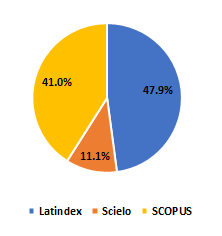Academic inbreeding and scientific production in teachers at a public university in Lambayeque, Peru
DOI:
https://doi.org/10.51252/rceyt.v2i2.516Keywords:
university teachers, academic oligarchy, academic practicesAbstract
Currently, the higher education establishments in Peru have shown deficiencies in terms of scientific research due to academic endogamy. The objective of this study was to describe and investigate the impact of academic endogamy on the scientific production of professors at the Universidad Nacional Pedro Ruiz Gallo (UNPRG). The observation technique was used, through which databases of teachers classified by professional career to which they belong were verified. Once this information was obtained, the university from which each professor graduated was sought to establish the level of academic endogamy. In addition, the data of scientific production were taken in indexed journals from professors throughout their professional careers. A total of 545 professors were accounted for, of which 75% were men, 4.6% belonged to a RENACYT group and academic endogamy of 68.3% was evidenced, in addition to the fact that the scientific production of all the professors, in general, were of 475 articles in indexed journals. There is a high percentage of endogamy at the Universidad Nacional Pedro Ruiz Gallo that could influence the academic performance of the institution.
Downloads
References
Altbach, P. G., Yudkevich, M., & Rumbley, L. E. (2015). Academic inbreeding: local challenge, global problem. Asia Pacific Education Review, 16(3), 317–330. https://doi.org/10.1007/S12564-015-9391-8
Borenstein, D., Perlin, M. S., & Imasato, T. (2022). The Academic Inbreeding Controversy: Analysis and Evidence from Brazil. Journal of Informetrics, 16(2), 101287. https://doi.org/10.1016/j.joi.2022.101287
de la Torre, E. M., Perez-Esparrells, C., & Romero-Madrid, T. (2021). Academic inbreeding in the Spanish public university system: a review of its institutional and context determinants (Endogamia en el sistema universitario público español: una revisión de sus determinantes institucionales y contextuales). Cultura y Educacion, 33(2), 229–258. https://doi.org/10.1080/11356405.2021.1904658
Demirkasimoğlu, N., & Büyükgöze, H. (2022). Academic inbreeding as a hiring policy: Capturing the voices of faculty from Turkey. KEDI Journal of Educational Policy, 19(2). https://doi.org/10.22804/kjep.2022.19.2.002
Garnov, A. P., Garnova, V. Y., Prodanova, N. A., Danko, T. P., Tat’yana, A., & Kostova, S. G. (2021). Academic inbreeding and mobility in higher education: problems, analysis and prospects. Linguistics and Culture Review, 5(S1), 901-911. https://doi.org/10.21744/lingcure.v5nS1.1474
Gokturk, D., & Yildirim-Tasti, O. (2020). The role of academic inbreeding in building institutional and research habitus: A case study from Turkey. Higher Education Policy, 35, 178–198. https://doi.org/10.1057/s41307-020-00201-1
Gorelova, O., & Yudkevich, M. (2015). Academic Inbreeding: State of the Literature. Palgrave Studies in Global Higher Education, 17–44. https://doi.org/10.1057/9781137461254_2
Horta, H. (2012). Deepening our understanding of academic inbreeding effects on research information exchange and scientific output: new insights for academic based research. Higher Education, 65(4), 487–510. https://doi.org/10.1007/S10734-012-9559-7
Horta, H., Meoli, M., & Santos, J. M. (2022). Academic inbreeding and choice of strategic research approaches. Higher Education Quarterly, 76(1), 76-101. https://doi.org/10.1111/hequ.12328
Horta, H., Veloso, F. M., & Grediaga, R. (2009). Navel Gazing: Academic Inbreeding and Scientific Productivity. Management Science, 56(3), 414–429. https://doi.org/10.1287/MNSC.1090.1109
Horta, H., & Yudkevich, M. (2016). The role of academic inbreeding in developing higher education systems: Challenges and possible solutions. Technological Forecasting and Social Change, 113, 363–372. https://doi.org/10.1016/j.techfore.2015.06.039
Horta, H. (2022). Academic inbreeding: Academic oligarchy, effects, and barriers to change. Minerva, 60(4), 593-613. https://doi.org/10.1007/s11024-022-09469-6
Hou, N. M. (2022). Academic Inbreeding Revisited: A Unified Index and a Quantitative Study of Academic Outputs. Innovation and Education, 4(1), 1-11. https://brill.com/view/journals/ined/4/1/article-p1_2.xml?
Inanc, O., & Tuncer, O. (2011). The effect of academic inbreeding on scientific effectiveness. Scientometrics, 88(3), 885–898. https://doi.org/10.1007/S11192-011-0415-9
Melville, A., Barrow, A., & Morgan, P. (2020). Inbreeding and the Reproduction of Elitism: An Empirical Examination of Inbreeding Within Australian Legal Academia. Legal Education Review, 30(1), 1–24. https://doi.org/10.53300/001C.13183
Morichika, N., & Shibayama, S. (2015). Impact of inbreeding on scientific productivity: A case study of a Japanese university department. Research Evaluation, 24(2), 146–157. https://doi.org/10.1093/RESEVAL/RVV002
Padilla, L. E. (2008). How has Mexican faculty been trained? A national perspective and a case study. Higher Education, 56(2), 167–183. https://doi.org/10.1007/s10734-007-9096-y
Seeber, M., & Mampaey, J. (2022). How do university systems' features affect academic inbreeding? Career rules and language requirements in France, Germany, Italy and Spain. Higher Education Quarterly, 76(1), 20-35. https://doi.org/10.1111/hequ.12302
Soler, M. (2001). How inbreeding affects productivity in europe. Nature, 411(6834), 132. https://doi.org/10.1038/35075637
Tavara, J. I. (2021). Governance and Regulation of the Peruvian University System: Overcoming Reform Resistance through Quality Assurance Policies. In Bulletin of Latin American Research (pp. 1–17). John Wiley & Sons, Ltd. https://doi.org/10.1111/blar.13139

Downloads
Published
How to Cite
Issue
Section
License
Copyright (c) 2023 Johnny Leandro Saavedra-Camacho, Sebastian Alfredo Iglesias- Osores, Johana Acosta-Quiroz

This work is licensed under a Creative Commons Attribution 4.0 International License.



